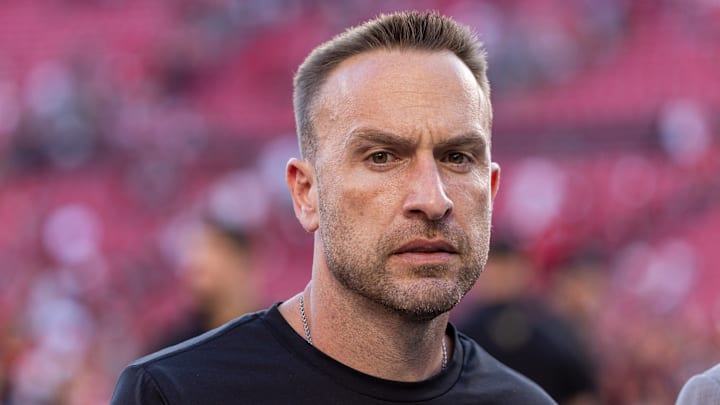Jeff Hafley just wants to coach ball. That is what he does best, and perhaps the biggest reason why the former head coach of the Boston College Eagles left the highest perch in Chestnut Hill for essentially second-in-command in Titletown. Hafley may only be 44 years old, but he does have seven year's worth of coaching experience in the NFL, dating back to 2012, most recently in 2018.
By him jumping ship this late in the cycle for the Green Bay Packers' defensive coordinator gig, it is a black mark on the sport of college football for sure, as well as another damning strike on the NCAA for being so incredibly feckless. It is a constant uphill battle as a college coach with no offseason in sight. You have to perpetually recruit, your players and theirs constantly. It has become a joyless slog.
Pete Nakos of On3 did a great job of explaining why Hafley left, as well as giving us some great additional context about the man we are talking about from the coach himself. Hafley spot with On3 back on Jan. 23 about the evolving landscape of college football, the one dominated by name, image, likeness. This has become an even bigger story with issues going on now at Tennessee once again.
For as good of a coach as Hafley is, Boston College just does not have the resources to compete.
“How do you define tampering, right?. Agents calling kids and telling kids that they can get them at this school for this amount of money and this school is interested. What’s true and what’s not true? I’ve had an example of hearsay. This school will take me out of the portal right now and give me this amount of money. And then I pick up the phone and call that school, call a buddy of mine, and it’s, ‘No, we don’t even know who that kid is.'”
Boston College does have a strong football history, but the private Catholic school in Massachusetts can be a hard sell for even the most mentally tough coaches and kids. At least it is a Power Four gig...
“Look, there’s some really good people and some really good agents. And just like anything else, some really bad ones that are trying to take advantage of kids. And it’s not right, and it’s not fair. There’s kids that are leaving good academic schools with a semester or two semesters left, where they’re going to get a life-changing degree, and instead, they’re getting convinced to transfer. It’s way bigger than making a few bucks right now. I get it, that’s easier said than done. I’m all for it. Let’s pay the players and give them some money. I think it’s all good, and I totally respect it. But we got to look at the degree aspect of this thing, too.”
Even if a guy like Hafley hits on a great wide receiver talent like he did with Zay Flowers, he has to fight like hell just to keep Flowers around for even one more season before he decides to enter the draft.
“One, is the money real? Can they trust the people that they’re talking to? Because a lot of the time, it’s not. So let’s look at that. Two, how close are you to getting your degree? I think we forget that these are student-athletes, these kids are in one of the best schools in the country, and you don’t want to throw that away and not play the long game where you’re gonna make a ton of money."
Lastly, I think Hafley's final remark about the changing college football landscape and NIL says it all.
“… I think it’s completely drifted away from what name, image and likeness was supposed to be.”
Hafley is not the first coach to leave the college game behind all together, and he won't be the last.
Jeff Hafley leaving Boston College for the Packers was not a hard decision
Look. For as much as I would like for their to be some guardrails on NIL, I cannot see that happening in the current structure of collegiate athletics. Every state is going to want to go about it differently. The various collectives all have their own agendas. Even under new leadership, people trust the NCAA less than the government, which is another strike against bureaucracy and endless red tape.
So basically if a coach is good enough to get hired onto an NFL staff from a college one, he is going to do that. It takes a special human being to be all about recruiting. These guys spend more time with these 16 and 17-year-olds than they do with their own families. The easiest solution is to have greater structure when it comes to National Signing Day and the transfer portal. Is there even a good one?
As long as prospective high school recruits want to enroll in college a semester early, this is going to keep getting worse. The advantages to being on campus and in the strength and conditioning program are just too good to do away with altogether. It is great for the kids, but it has been terrible for coaches and their families, as the offseason is just the beginning of the next season, and so on.
The sooner we get a governing body strictly in charge of FBS football, the better off we all will be.
